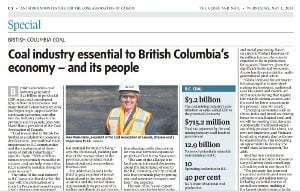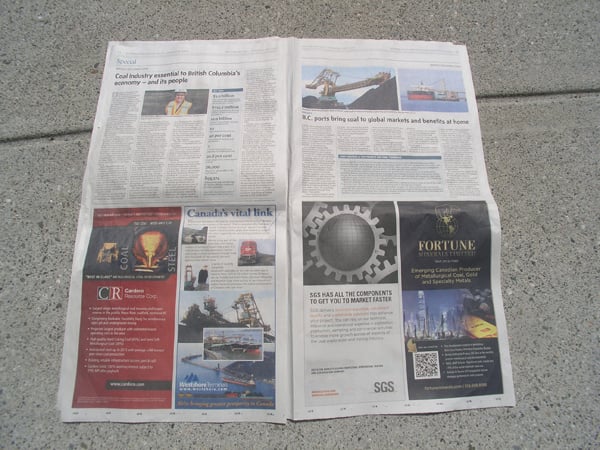
In the lead-up to the provincial election, a special Globe and Mail feature extolling the virtues of B.C.'s coal industry has raised concerns about the increasingly blurred line between editorial and promotional content.
On May 1, the paper's B.C. section included a three-page section about the coal mining industry.
Below each of the three articles -- Coal Industry Essential to British Columbia and Its People, B.C. Ports Bring Coal to Global Markets and Benefits at Home" and Responsible Development Ensures that Coal Production Balances Economic, Environmental and Social Goals" -- were ads from various mineral and energy companies, as well as for VoteMining.ca. A note at the top of each page identified the section as "an information feature for the Coal Association of Canada."
This raised alarm bells for Kevin Washbrook, director of Voters Taking Action on Climate Change (VTACC).
Since the Coal Association of Canada is a registered sponsor under the Election Act (as is VTACC), Washbrook reasoned that the feature constituted advertising, and should have therefore included an authorization statement indicating who paid for it.
Instead, at the bottom of the section there was a statement noting the "report" was produced by RandallAnthony Communications Inc. in conjunction with the advertising department of the Globe and Mail.
Washbrook emailed Elections BC electoral finance officer Mark Thompson with his concerns.
"Coal exports are a major issue in the current election, in large part because of a pending decision on approval of a new coal export terminal in Metro Vancouver. Engagement in the election through the supplement appears to be anticipated by the inclusion of the votemining.ca advertisement on page C3," wrote Washbrook. "We would like to request an opinion on whether this newspaper supplement constitutes election advertising and if so if it has failed to meet the requirement for authorization under S 231 (1)."
Thompson told The Tyee that, after following up with the Globe, he was satisfied the supplement was not paid advertising because the articles were written on behalf of the Globe and Mail and were published without charge.
And under the Election Act, "Any articles, editorials, interviews, columns, letters, debates and commentaries published without charge in a bona fide periodical publication, such as the Globe and Mail, are not election advertising."
'Puff pieces'
Kathryn Harrison, also a VTACC director and political science professor at the University of British Columbia, saw the information feature as well. She described the articles as uncritical "puff pieces."
"I'm not a journalism prof, just someone who cares about open and balanced public debate," she said. This, she says, reminded her of the Liberal Party's front page ad in 24 Hours Vancouver -- an ad that closely resembled a leading news story.
Like a regular news article, the coal mining information feature pieces had headlines and photos, and were packaged in a similar layout to the rest of the paper. Unlike a regular news article, there were no bylines.
According to Harrison, she left a message with Richard Deacon, the Globe's national business development manager, to ask who wrote the articles. Harrison said Randall Mang, president of RandallAnthony Communications (which produced an oil sands information feature for the Globe in October) returned her call and claimed responsibility for the articles. Mang did not respond to The Tyee's requests for comment by publication time.
Free content from Globe supporting Coal Association
The paper's public editor Sylvia Stead told The Tyee that information features constitutes advertising, not editorial. She said that "generally means the partial page of written copy and other advertising below are paid for by the advertiser" but could not confirm that in this particular case.

The Tyee asked Deacon why the Globe and Mail would provide free content for the Canadian Coal Association (when such information features sell for tens of thousands of dollars) but he did not reply by publication time.
Stead didn't respond to a question about whether readers could be misled by an information feature resembling a newspaper section.
Michelle Mondeville, director of communications and stakeholder relations for the Canadian Coal Association, told The Tyee the association did not pay for the information feature.
Both the Canadian Coal Association and Westshore, operator of the Delta coal export terminal, linked to the information feature on their websites. ![]()
Read more: Energy, Labour + Industry, Media, BC Election 2013
















Tyee Commenting Guidelines
Comments that violate guidelines risk being deleted, and violations may result in a temporary or permanent user ban. Maintain the spirit of good conversation to stay in the discussion.
*Please note The Tyee is not a forum for spreading misinformation about COVID-19, denying its existence or minimizing its risk to public health.
Do:
Do not: